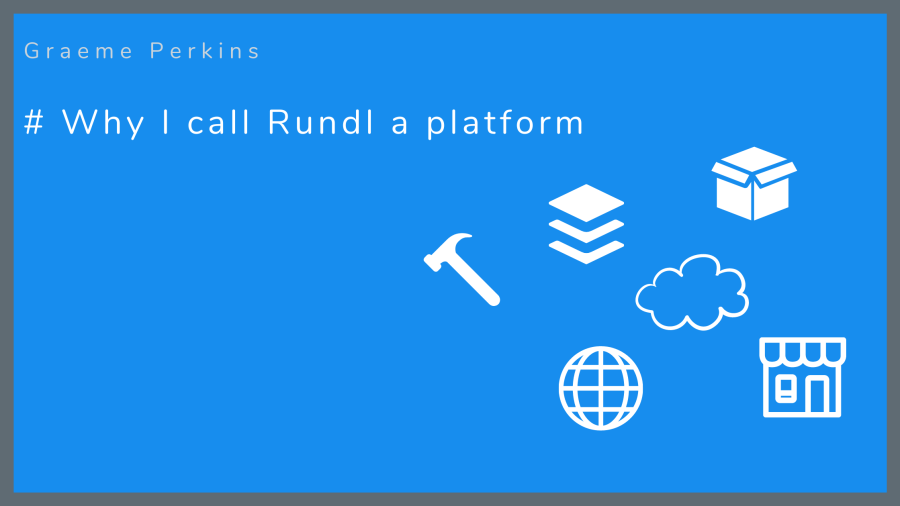
When I'm describing Rundl I'm not always consistent in the language I choose. I've said (and heard) all of the following statements:
- Rundl is a tool for real estate professionals to do X.
- Rundl is a collaboration application for multiple parties to work together.
- Rundl is a business network.
- Rundl is a platform for industries to connect.
Mostly I try to call Rundl a platform, but in this article I'll flesh out a range of labels and see where it ends up. Hopefully it'll make clearer what Rundl is and what it's for.
Tool
A tool is of course, for example, something like a hammer. And everyone knows what to do with a hammer. I love software tools: having a go-to piece of software that solves a specific problem.
The problem with using tool to describe Rundl is Rundl doesn't feel like a hammer (continuing the analogy) when you're using it. There's too much going on to suggest one purpose like knocking in nails.
Rundl is perhaps more like a toolkit, with lots of different tools packed in together. However, because Rundl can be applied in many different type of processes or industries, I try to keep this particular term out of my "how to describe Rundl" lexicon.
Network
A network is a set of connected nodes. On the consumer web a common type of network is a social network -- think services like Facebook, Twitter, LinkedIn, TikTok or SnapChat. The nodes in these examples are people and, to a lesser extent, companies.
I think it's fair to say, if you deleted half your connections in most of those applications, they won't become just half as useful. Instead I think their utility will sink even further. There'd be a proliferation of niche networks. It's having all your connections in one place is what makes them sticky, at the cost of features or functionality targeted at specific use cases.
Rundl does involve connecting people, companies and services together. But you'll never need all your connections there to get value. These types of connections are not the primary purpose of Rundl.
Interestingly, when I do use the term network, I contrast a network of people with a network of services. I find it does help to think about Rundl as a network of services, such as having conveyancing, financing and property sales services brought together.
SaaS
SaaS always speaks to me in terms of software licencing. That's why I tend to use SaaS to describe software I can choose to either buy "off-the-shelf", or by subscription as a managed service.
Rundl only works in the cloud, and there's only one Rundl. That's why I find SaaS not so helpful.
Marketplace
A marketplace is a place people go to do business. In the process new relationships are formed.
In this sense, Rundl is not a marketplace. On Rundl the relationships usually already exist. Businesses use Rundl to manage delivery of their service. They onboard their existing relationships in the process.
The idea of new or existing relationships plays out in pricing models too. When businesses connect with consumers in a marketplace, the marketplace usually wants a decent cut of any sales.
Like Apple's App Store. It takes a 30% commission for it's role in connecting the software provider with the customer they otherwise would not have (the mobile platform does does a lot more than aid discovery of course, but this is just for the sake of argument).
Marketplaces are an extremely powerful model. They may not only take a large commission, but once they gain traction they may also start monetising the customer's attention with ads for competing services, or even capturing some of the brand recognition for the service that's delivered (e.g. I'm getting UberEats tonight). For businesses, there are reasons to take care when using marketplaces.
On Rundl users pay a fee per transaction. We don't try to dis-intermediate our users from their customers and clip the ticket. And we don't sell ads or promote anything. So our model is more like the AWS on demand model than the Apple App Store model. That's why I don't call Rundl a marketplace.
Platform
To me, a platform is something you build something else on top off.
Rundl is definitely designed with an API-first mindset. And we strive to support all kinds of services, which our hosts can "build".
In fact, while Rundl grew out of the real estate industry, there's really no mention of real estate in our core API entities. Anything you can see in Rundl that's to do with real estate actually sits on top of Rundl.
So personally, I think of Rundl as a platform. Because its fundamentally about building your own service. We keep the Rundl branding pretty neutral and show off the service provider's brand first and foremost.
Application
An application is the opposite of a platform. It's something already "applied", usually to a specific use case.
In this sense, Rundl has been applied to the use case of multi-party collaboration in workspaces, around a configurable process. But that's a very generic use case and why calling it an application doesn't provide much meaning.
It is a bit more complicated than that though. Rundl also build small applications, which we call add-ons. And our customers can build embedded apps. These run on top of the Rundl platform and are presented within https://go.rundl.com. But this actually illustrates the point. Add-ons or embedded apps, even though coupled with our collaboration, are still logically separate applications. So overall, the term application is a bit too narrow.
So after going through these labels I'm going to stick to calling Rundl a platform. It's the one term that seems simple and still fairly precise. But of course you can take a bit from each category. Until Rundl gets wider recognition I'm sure I'll keep grasping for known software categories to tell our story.
Have any questions?
For more information please send us your enquiry.
